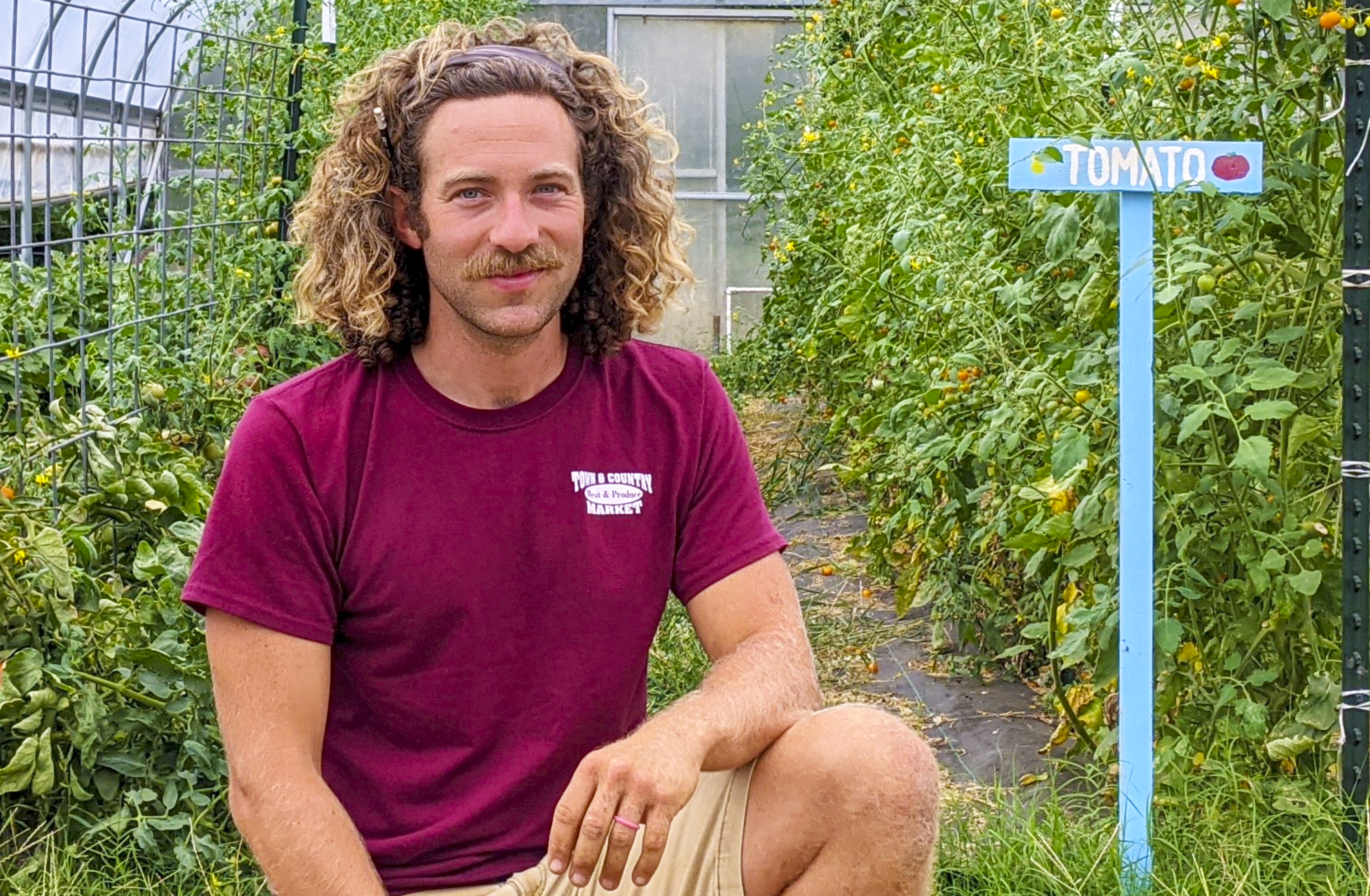Taylor Black was hired this summer to ramp up food production at Loy Farm in coordination with Harvest Table Culinary Group at Elon University
Elon University’s campus will enjoy the fruits of a partnership between Harvest Table and Loy Farm this year as a new farm manager strengthens a farm-to-table program with Elon Dining.
Taylor Black was hired this summer to manage Loy Farm and coordinate with Harvest Table chefs in planning menus around seasonal fruits and vegetables grown there this year and into the future.
Along with fresh produce, patrons of Clohan Hall can expect to taste both familiar and unusual varieties of vegetables as the dining hall transitions to a plant-forward, vegetarian menu this year. Guests can also expect to learn the history behind those ingredients and to understand their growing and harvesting process.

“Our goal isn’t just to grow regular tomatoes, but to grow produce students have never experienced before,” said Laura Thompson, Harvest Table’s resident district manager. “A good example is the Cherokee purple tomato, which is native to Alamance County. We want to tell the story of these native plants, bringing those stories into dining halls and connecting them back to Loy Farm as part of the living-learning experience at Elon.”
The farm-to-campus dining collaboration is the first of its kind among the campuses Harvest Table serves.
Ramping up farm production for Elon Dining has been a goal for years, said Michael Strickland, director of the Center for Environmental Studies. In past years, the farm provided Harvest Table with produce in times of overabundance. Loy Farm has primarily been used as an outdoor classroom and research site for students to experiment, with most produce going to local food kitchens and community pantries.
This year, a second high tunnel greenhouse will be built, doubling the amount of available produce. An additional plot of the field will also be dedicated to growing food for campus. The new farm manager position funded jointly by Elon College, the College of Arts and Sciences and Harvest Table will oversee these areas and student interns that work on the farm and create farm production schedules in tandem with chefs.

“This creates an interesting loop where students can see all the intricacies that go into putting food on the table,” Strickland said. “Many of them are interested in and already have experience in preparing and cooking meals but haven’t had as much experience in getting food to the kitchen other than buying from a store or better yet the farmers market.
“And Harvest Table is all about making this an educational experience for all involved. They have a deep commitment to local foods and traditional foods like heirloom vegetables — things that have a history, a story. Their chefs want to learn to cook with new and interesting produce, and with new and interesting recipes, and then turn that into an educational experience for those eating the food.”
The search for a full-time manager brought job applications from as far away as Vermont and Arizona, but faculty and Harvest Table staff selected a homegrown candidate to strengthen their partnership. Black, who holds a bachelor’s degree in international studies and an associate degree in sustainable agriculture, has worked at Elon as a landscaper since 2019.
“I’m excited to help create what this program will look like,” Black said. “In some ways, we’ll all be figuring out together how this will work. It’s going to be fun.”
His experience, enthusiasm and willingness to experiment with chefs and interns to create a farm production schedule are attributes that led to his hire. Black has been leaning into a career in agriculture since he first took classes at the University of North Carolina at Greensboro nearly 10 years ago.
“I think it’s important to take holistic approaches to improving the world. Sustainable agriculture is a good place to start. It brings communities together and it’s a way to take care of the planet,” Black said. “In a way, I feel like everything I’ve done up to this point has been leading to this.”
Seeds for traditional fall and cold-weather crops — broccoli, kale, collards — are already in the ground. Space inside the high tunnel that isn’t being used by classes or for other projects this fall will be allocated to Clohan Hall chefs. By spring, the second high tunnel should be available for dining hall produce.

Other changes students will notice at Loy Farm are upgrades to the farm shed into a year-round classroom space, cozy enough for cool winter days but enclosed with sliding garage doors for open-air gatherings in warmer months.
Experiential learning is the backbone of the environmental studies department, Strickland said. They call it the “muddy boots” theory: Getting your hands and boots dirty in the planning, building, growing and harvesting of a farm builds knowledge and skills that can’t be taught in a classroom.
“We want the entire spectrum of experiences at Loy to help students gain self-confidence, self-reliance and a reflective approach to working with your hands and backs,” Strickland said. “Many Elon students already have a deep concern with issues of food justice, food access, farm-to-table and healthy eating, but not so many have experience in the gritty details of food production. Seeing the entire process of seeding, planting, nurturing, harvesting and preparation of food right here, and then having it on their plates in the dining hall can be a truly enlightening experience.”
Those interested in interning at Loy Farm should contact Strickland at mstrickl@elon.edu.



